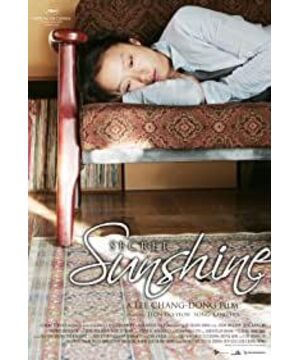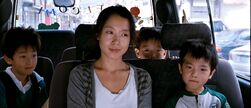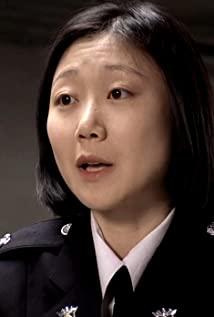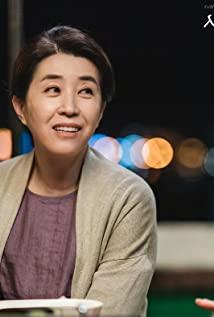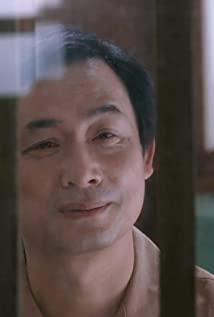The article comes from foreign film reviews--Yu Bowen--Interpretation of "Miryang" from the perspective of feminism
1. Korean film and director Lee Chang-dong
The development of Korean films in recent years can be described as a sudden emergence. From the single description of the history of the nation in the past, to the pursuit of philosophical and international creation; on this basis, efforts have been made to build a standardized aesthetic form dominated by narrative, and a group of directors with distinctive styles and considerable strength have emerged. . For example, director Lee Chang-dong, who expresses misery and lowliness, and redemptive thinking in films such as "Miryang" and "Oasis", Kim Ki-duk, who is characterized by boldness and cruelty, and who faces his desires, Bong Joon-ho, who is characterized by grand narrative and horror and bizarreness, Park Chan-wook with the theme of dark revenge and bloody violence.
In 1954, Li Cangdong was born in a commoner family in Daegu, South Korea. He had a difficult life and suffered humiliation when he was young. Painful life experiences, subtly reflected in his films, established the emotional tone of "broken and hurt". Most of the protagonists are marginalized characters in society. With a well-conceived narrative style and deep-rooted realistic brushstrokes, they not only show the huge tension in the little characters, but also deduce the tragic ending of "unexpected and reasonable".
2. The micro-theory of feminism and the outline of "Miryang"
The second trend of feminism originated in the West in the 1960s, with the main purpose of ending gender exploitation and oppression and promoting equality between the sexes. At the same time, there is a different feature from the past, that is, the simultaneous rise of feminist literary criticism. The related micro-theories are also emerging one after another, such as status expectation theory, role theory, network theory and so on. The feminist status expectation theory holds that: after the two genders enter the gender-interleaving target dynamic group, because the expectations of men in the group are higher than that of women, women's self-confidence, prestige and power will also decrease when they interact. If a woman wants to go against the trend, she will be opposed, hostile, or even hurt by both genders in the group. In this case, the gender expectation pattern is further consolidated.
The plot of the movie "Miryang" is: A woman named Li Shenai, after her husband's death, brought her son, Jun Er, from Seoul to a small town called "Miryang" to teach the piano for a living. The words and deeds of "going against the trend, anti-vulgarity, and anti-belief" of being independent and deviant have caused them to be "killed by words" by women in small towns, "killed by men", and "killed by gods" by religions and believers; After losing his beloved son, abused by relatives, ridiculed by enemies, ridiculed by religion, and committed suicide by cutting his wrists, he finally had to succumb to reality and do as the locals do.
In the character setting of this film, Li Cangdong arranged a woman at the bottom, and the role is the main body of performance, depicting the tragedy of women with heavy colors. Throughout the domestic interpretation of Li Cangdong's films, most of them stay in the field of existentialism; but the author believes that the fate of the "little people" characters concerned and shaped in Li Cangdong's films contains profound propositions of feminism. Status Expectation Theory in Feminism, Comments on "Miryang".
3. Feminism's torture and confirmation of "Miryang"
In the background of the film, South Korea, although the voice of improving the status of women has been increasing in recent years, it is still a patriarchal society in concept. The masculinity of the first female president Park Geun-hye, such as courage, fortitude, and courage, in the election campaign also contradicts the social and cultural respect for patriarchy. Under the influence of Confucianism, men take self-cultivation, patriotism, and achievement as their life aspirations; women take the three obedience and four virtues, the husband and the child as their traditional virtues. The overwhelming number of women who have plastic surgery to please men's aesthetics also reflects the influence of patriarchy and supremacy. If a woman wants to go against the trend, the difficulty and outcome she faces can be imagined.
(1) Why Shen Ae wants to go back to Miryang
The heroine Shen Ai in the film has piano skills, isn't it better to choose a city bigger than Miryang for development? Why only go back to Miryang? Is it to imagine the love of her husband's dead soul, or to realize her husband's love? What about unfinished business? In my opinion, neither. She knew that her husband had a "criminal record" of cheating, but she was still driven by the ethical standard of "obey the father before marrying, and obey the husband when married." She believes that her son is both her husband and a descendant of Miryang, and she takes him back to his deceased husband's hometown to live. Justified. Here it seems that Shen Ai is going to bring her son to find another new life, but it is actually revealed from the mouth of Jun Er's uncle: Shen Ai's mother's family cannot tolerate her "splashed water", which quietly hints at her whereabouts.
(2) Can men's help avoid "kidnapping"?
The hero, Jong Chan, has been with Shin Ae ever since he appeared beside Shin Ae. Helping her to rent a house, help her recruit students, go to church, etc., consciously or unintentionally, she has solved many difficulties that a weak woman cannot cope with. Although Shen Ai verbally expressed "strong", saying "I do my own affairs by myself", in order to refuse help; but a woman from a foreign country, in the eyes of the world, is obviously "insufficient", facing the unfamiliar life. In the predicament, she could not help but make an actual refusal. Although this greatly consumed her self-confidence and lowered her self-esteem, people had to bow their heads under the roof. Moreover, with classrooms, students, and singing and dancing partners, it seems that there is another small world. When the extortion call came, she rushed out of the house in a panic, and instinctively wanted to find Zong Can for help. After all, this was the first man she had been in contact with the most since she came to Miryang; but when she saw him dancing in the shop Zong Canshi, but he may have thought a lot: Can he help? Could he be an accomplice of the kidnapper? He promised himself, can he repay the debt? How will the neighbors view their relationship? These concerns are all It is reasonable, but Shen Ae suddenly had the idea of trying to get rid of Zong Can's help or control, and wanted to rescue her son by herself, so she turned away in hesitation. According to common sense, at the critical juncture of the robbery, it is the best policy to save the child first, but her unreasonable "anti-trend" approach this time, after she has exhausted her savings, she still cannot meet the requirements of the kidnappers, and finally she was arrested. The torn ending. Suppose Shen Ai does not try to be a temporary force and turns to Zong Can for help. In the best case, Zong Can can not only help her with advice, but also help her raise money or call the police; Knowing whether he is an accomplice of the kidnappers, even if he is an accomplice, can buy time for bargaining and dealing with the child, and perhaps the tragedy will not happen. In contrast, the above two plots show that a widowed woman in a patriarchal society receives "more help" or "little help", and her living conditions are quite different. Although women's own thinking, physical ability, emotion and other factors make them weak in some aspects, in the social group defined by the status expectation theory, men naturally think that women are weak and can be bullied. If a woman, especially a widow, does not have a male backer, the consequences of being ridiculed, blackmailed, and murdered fall on Shen Ae, the "soft and astringent persimmon".
(3) Why do women "kill" Shen Ai
Not only the small town of Miryang in the film, but every place has its own dialects, customs, clear and unspoken rules, customs and so on. According to the usual principles of life, a foreign woman living in an unfamiliar place first needs to follow the local customs, obtain a common language with the women who have lived here for a long time, at least make "three good friends", and become familiar with the way of words and deeds here. and characteristics, and then gradually integrated into the local social groups. Otherwise, the first thing a woman suffers from is the "word killing" in the female group. In the film, Shen Ae's words, deeds and consequences when she gets along with several women all reflect this cruel reality. First, after she came to the "Romans" clothing store, she said that the lights in the store were dark and the popularity was low, and she suggested that the boss renovate. Soon, this woman and advice from Seoul became the talk of the women in the barbershop. Li Cangdong's design of scenes, characters, and language here can be described as intriguing. As a Chinese audience, he can especially experience the effect of the barber shop as a "news distribution center". The women talked about the decoration of the clothing store, and soon they discussed "why bring the children to live in the hometown of the deceased husband", and speculated that "the son seems to be abnormal" and so on; and these discussions, for Shen Ai, who was also present, More like an intentional move. This kind of psychological feeling of being ridiculed and hostile can be imagined. Second, when a devout female believer in the pharmacy persuaded her to teach her, she categorically refused: "I don't believe this." This time, although the women did not babble, she was immediately attacked face to face: "You are a poor person!" "I heard something bad happened to you before you came to Miryang"; with such a blow, Zhizhong applied for the love room, and after explaining his thanks to the female believers, he fled, even forgetting his son who was still at the door. The third is that after listening to her son's speech at school, she stood up and shouted loudly, which immediately attracted the attention of other matriarchs around her. Ordinarily, it is natural for others to look at each other when they hear the exclamation. However, in the small town of Miryang, where the folk customs are closed and the Women's Day is observed, the matriarchs are all sitting upright, listening to your son's speech, and seeing your Seoul woman again. The shouting and shouting, the gaze cast was unnatural. A single glance may lead to death. The side glances of the matriarchs have already replaced language. What language does these glances contain?
As can be seen from the above clips, as an orphan and a widowed mother, she is a vulnerable group in people's eyes, but Shen Ae's words and deeds are a surprise, a kind of rebellion, a kind of surprise to the women and men in Miryang. The excitement attracted ridicule and scorn from women, as well as kidnapping and blackmailing and tearing of votes from men; it also caused Shin Ae to continue her life in Miryang, where she faced obstacles and struggled.
(4) Is Religion Salvation or "God Killing"
The arrangement of various roles in women's living space in the film "Miryang" can be described as taking into account the importance and detail, and the details are appropriate. With regard to Shen Ae's father's "paternal power" and her husband's "husband power", she will neither show her voice nor show images. But in the relationship between religion and people, especially with women. On the show, it is arranged with the main part, and it expresses Shen Ai's rectification with religion after losing his son with heavy brushstrokes and conflicting plots. It can be said to be the climax of the play.
Facing the great pain she experienced after her youngest son was murdered, Shen Ae chose to believe in Christianity and use the religion of "I don't believe in this" to numb herself, trying to get liberation and redemption from it. But when she saw her enemy's daughter being bullied, she turned a blind eye and drove away. It can be seen that religion has no redemptive effect on her. Under the influence of the pastor and the faithful, she seemed to be liberated and reborn. So, surrounded by all the faithful, he came to the prison and tried to forgive the enemy who killed his son, but what Shin Ae did not expect was that the enemy said that he "has God's forgiveness and is still praying for Jun Er's mother". Also known as himself "wide-hearted and fat", he has the meaning of "anti-redemption" to Shen Ai. This inevitably makes the author want to create a new version of the parable of "The Priest and the Bear". The dialogue design is that Shen Ai prays: "God! You saved me, please turn my enemy into a Christian!" The palm said: Thank you, God! Give me Jun Er, I will kill him, and get God your forgiveness in prison. The answer of the murderer made Shen Ae tangled: I went to forgive the enemy on behalf of God, but the enemy has been forgiven by God, isn't God teasing me? So Shen Ae hysterically sent out "Isn't it all fake?" shout. This conversation with the enemy completely subverted Shin Ae's belief in religion. However, she did not have the unshakable faith in God like other believers; nor did she swallow up her voice and resign like unbelievers; instead, she cheated with priests and put disturbing music on lectures. A blasphemous, "anti-trend" act of revenge. Shen Ai's rebellious behavior against religion was exchanged for the pastor's verdict that "according to God's will, you lived really hard." "Killing" hurts Shen Ai's heart; in the religious atmosphere, if you "go against the trend" against the gods, you will not escape the fate of "killing the gods".
(5) What is the fate of Shin Ae after her suicide?
Shen Ae's maverick and deviant behavior is destined to lead her to a dead end. After being betrayed by all but Zong Can, she embarked on the road of suicide by cutting her wrists. At this point, the film is coming to an end, but Shen Ae's life is not over. What is the destination after he escapes and is discharged from the hospital? Li Cangdong arranged two intriguing plots, one is to let the daughter of the murderer get her haircut; In the close-up at the end of the play, Zong Can diligently held the mirror, Shen Ai cut her hair, and scattered in the soil under the sun. The author believes that the former wants to tell Shen Ai that although the enemy’s daughter will not help her and you will not save her, she learned to cut her hair in a young school. Shen Ai, don't "toss" anymore. The latter close-up can be interpreted in two layers: one is to let Shen Ae see clearly her self in the mirror, and at the same time to see Zong Can who has always been there to help her; the other is to suggest that life wants to find The destination must be down-to-earth, and people follow the customs to make a living.
View more about Secret Sunshine reviews


